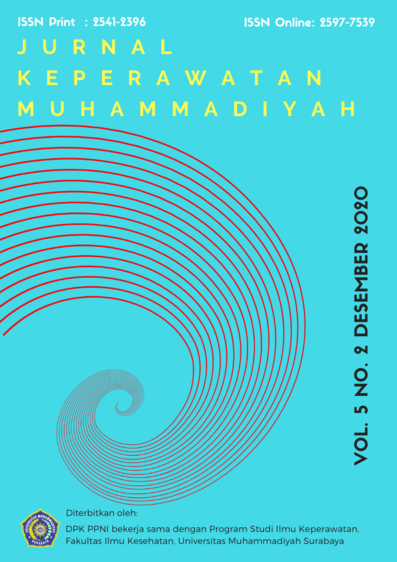Hubungan Kebiasaan Makan Pagi (Sarapan) Dengan Status Gizi Anak Usia Sekolah Di SD Muhammadiyah Terpadu Ponorogo
DOI:
https://doi.org/10.30651/jkm.v5i2.5817Keywords:
Breakfast Habits, Nutritional Status, School Age ChildrenAbstract
Objective: Elementary school age children nutrition problems are the impact of an imbalance between food intake and nutrients released by the body. This can be caused by not having breakfast habits. Eating breakfast has the benefit of maintaining endurance and increasing learning concentration. The breakfast habit provides the energy and nutrients needed to carry out various activities throughout the day such as school, study, and play optimally. This study aims to determine the relationship between breakfast habits and nutritional status of elementary school children.
Methods: This research was conducted at SD Muhammadiyah Terpadu Ponorogo class 4 and 5 with a sample of 113 students. The measuring instrument used was a questionnaire to explore the variables of breakfast habits, while to determine the nutritional status of students using a weighing scale. Nutritional status was calculated IMT/U. The bivariate analysis test used the Chi Square test of significance level 0.05
Results: Chi square test results obtained p-value 0.406 means that there is no relationship between breakfast habits and nutritional status of school age children at SD Muhammadiyah Terpadu Ponorogo. Many factors influence nutritional status. Respondents do not usually eat breakfast, but during recess they eat by buying a canteen and in their daily life they like to eat vegetables and fruit so there is no problem with nutritional intake.
Conclusion: Researchers recommend to the next researchers to dig deeper about the composition of the food at the time the respondent had breakfast.
Â
Â
References
Anugraheni, Mulyana, Farapti. 2019. Kontribusi Bekal Makanan dan Total Energi terhadap Status Gizi pada Anak Sekolah Dasar. Open access under CC BY –SA license. Published online: 04-3-2019. 52-57
Anzarkusuma IS, dkk. 2013. Status Gizi berdasarkan Pola makan Anak Sekolah Dasar di Kecamatan Rajeg Tangerang. Indonesian Journal of Human Nutrition.Vol 1 No. 2 (2014). 135-148
Departemen Kesehatan RI. 2005. Pedoman Perbaikan Gizi Anak Sekolah Dasar dan Madrasah Ibtidaiyah. Jakarta. Direktorat Jenderal Bina Kesehatan Masyarakat. Direktorat Gizi Masyarakat.
Khomsan, A. 2003. Teknik Pengukuran Pengetahuan Gizi.Jurusan GMSK. Faperta. IPB.Bogor
Latifah M Al-Oboudi, 2010. Impact Of Breakfast Eating Pattern On Nutritional Status, Glucose Level, Iron Status In Blood, And Test Grade Among Upper Primary School Girls In Riyadh City, Saudi Arabia. Pakistan Journal Of Nutrition 9 (2): 106-111, 2010.
Mariza dan Kusumastuti. 2013. Hubungan Antara Kebiasaan Sarapan Dan Kebiasaan Jajan Dengan Status Gizi Anak Sekolah Dasar Di Kecamatan Pedurungan Kota Semarang. Journal of Nutrition College, Volume 2, Nomor 1, Tahun 2013, Halaman 207-213. Online di: http://ejournals1.undip.ac.id/index. php/ jnc
Supariasa. (2001). Penilaian status gizi. Jakarta:EGC
Winarti dan Khayati. 2015. Hubungan Makan Pagi Dengan Prestasi Belajar Anak Kelas V Sekolah Dasar Negeri I Jomboran Klaten. Motorik Jurnal Ilmu Kesehatan. Vol. 10 No. 20 (2015).hal 41-46.http://jurnal.stikesmukla.ac.id/index.php/motor/article/view/221
Yulyastri dan Widaryati, 2014. Hubungan Pola Makan Pagi dengan Status Gizi Siswa di SD Muhammadiyah Bendo Srandakan Bantul. http://digilib. Unisayogya.ac.id/id/eprint/437
Downloads
Published
Issue
Section
License
- Penulis tetap memegang hak atas karyanya dan memberikan hak publikasi pertama kepada jurnal ini yang secara simultan karya tersebut dilisensikan di bawah:Â Creative Commons Attribution-ShareAlike 4.0 International (CC BY-SA 4.0)













